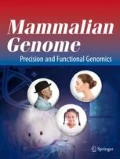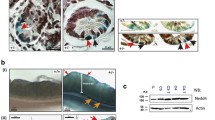Abstract
ZNF148 (ZBP-89, Zfp148) is a multifunctional transcription factor expressed at low levels in most tissues. When overexpressed in gastrointestinal cancer cell lines, ZNF148 inhibits cellular proliferation and induces apoptosis. We sought to determine whether intestinal ZNF148 overexpression would abrogate adenoma development in the ApcMin/+ mouse, i.e., whether ZNF148 is a tumor suppressor. The 13-kb villin promoter was spliced upstream of the ZNF148 cDNA to generate transgenic villin-ZNF148 (ZNF148TgVZ) mice. Intestinal mucosal ZNF148 expression was elevated in four of five ZNF148TgVZ lineages and correlated with increased caspase-3 expression and activation. In addition, DNA fragmentation was increased in ZNF148TgVZ mice relative to wild-type littermates. These results suggested that increased intestinal ZNF148 expression induces apoptosis. ZNF148TgVZ mice were crossed with ApcMin/+ mice to assess the biological significance of intestinal ZNF148 overexpression. The presence of the ZNF148TgVZ allele in ApcMin/+ mice correlated with reduced gastrointestinal bleeding at 5 weeks, a 50% reduction in adenoma burden at 20–22 weeks, and prolonged survival (median survival of 33.5 days vs. 21.5 days), relative to nontransgenic littermates. These data suggest that enhanced ZNF148 expression activates intestinal apoptosis and thereby mitigates disease burden in ApcMin/+ mice. They also suggest that ZNF148 is a therapeutic target to inhibit colon cancer development.



Similar content being viewed by others
References
Bai L, Merchant JL (2000) Transcription factor ZBP-89 cooperates with histone acetyltransferase p300 during butyrate activation of p21waf1 transcription in human cells. J Biol Chem 275, 30725–30733
Bai L, Merchant JL (2001) ZBP-89 promotes growth arrest through stabilization of p53. Mol Cell Biol 21, 4670–4683
Bai L, Logsdon C, Merchant JL (2002) Regulation of epithelial cell growth by ZBP-89: potential relevance in pancreatic cancer. Int J Gastrointest Cancer 31, 79–88
Chen T, Yang I, Irby R, Shain KH, Wang HG, et al. (2003) Regulation of caspase expression and apoptosis by Adenomatous Polyposis Coli. Canc Res 63, 4368–4374
Johnson IT (2002) Anticarcinogenic effects of diet-related apoptosis in the colorectal mucosa. Food Chem Toxicol 40, 1171–1178
Keates AC, Keates S, Kwon JH, Arseneau KO, Law DJ, et al. (2001) ZBP-89, Sp1, and nuclear factor-kappa B regulate epithelial neutrophil-activating peptide-78 gene expression in Caco-2 human colonic epithelial cells. J Biol Chem 276, 43713–43722
Law DJ, Tarle SA, Merchant JL (1998a) The human ZBP-89 homolog, located at chromosome 3q21, represses gastrin gene expression. Mammal Genome 9, 165–167
Law GL, Itoh H, Law DJ, Mize GJ, Merchant JL, et al. (1998b) Transcription factor ZBP-89 regulates the activity of the ornithine decarboxylase promoter. J Biol Chem 273, 19955–19964
Law DJ, Labut EM, Adams RD, Merchant JL (2006) An isoform of ZBP-89 predisposes the colon to colitis. Nucleic Acids Res 34, 1342–1350
Madison BB, Dunbar L, Qiao XT, Braunstein K, Braunstein E, et al. (2002) Cis elements of the villin gene control expression in restricted domains of the vertical (crypt) and horizontal (duodenum, cecum) axes of the intestine. J Biol Chem 277, 33275–33283
Mähler M, Bristol IJ, Leiter EH, Workman AE, Birkenmeier EH, et al. (1998) Differential susceptibility of inbred mouse strains to dextran sulfate sodium-induced colitis. Am J Physiol 274, G544–G551
Merchant JL, Iyer GR, Taylor BR, Kitchen JR, Mortensen ER, et al. (1996) ZBP-89, a Kruppel-like zinc finger protein, inhibits epidermal growth factor induction of the gastrin promoter. Mol Cell Biol 16, 6644–6653
Moser AR, Pitot HC, Dove WF (1990) A dominant mutation that predisposes to multiple intestinal neoplasia in the mouse. Science 247, 322–324
Su LK, Kinzler KW, Vogelstein B, Preisinger AC, Moser AC, et al. (1992) Multiple intestinal neoplasia caused by a mutation in the murine homolog of the APC gene. Science 256, 668–670
Takeuchi A, Mishina Y, Miyaishi O, Kojima E, Hasegawa T, et al. (2003) Heterozygosity with respect to Zfp148 causes complete loss of fetal germ cells during mouse embryogenesis. Nat Genet 33, 172–176
Trock B, Lanza E, Greenwald P (1990) Dietary fiber, vegetables, and colon cancer: critical review and meta-analyses of the epidemiologic evidence. J Natl Cancer Inst 82, 650–661
Wang X, Brown IL, Khaled D, Mahoney MC, Evans AJ, et al. (2002) Manipulation of colonic bacteria and volatile fatty acid production by dietary high amylose maize (amylomaize) starch granules. J Appl Microbiol 93, 390–397
Zavros Y, Eaton KA, Kang W, Rathinavelu S, Katukuri V, et al. (2005) Chronic gastritis in the hypochlorhydric gastrin-deficient mouse progresses to adenocarcinoma. Oncogene 24, 2354–2366
Acknowledgments
This work was supported by Public Health Service NIH grants DK55732 (JLM) and DK065004 (DJL). Funding for this project was provided through the Pilot Feasibility Program (DJL) of the Michigan Gastrointestinal Peptide Research Center (2P30DK34933-20) and in part through the University of Michigan Cancer Center (5P30CA46592). The authors thank Intrexon Corporation (Roanoke, VA) for assembly of the pVillin-ZNF148 construct. Deborah Gumucio and Blair Madison generously provided the villin promoter donor plasmid. Art Tessier and Gail Kelsey provided administrative support. Scherezade Momin provided technical assistance. The authors gratefully acknowledge the expertise of the University of Michigan Transgenic Animal Model Core, especially Thom Saunders, Linda Samuelson, and Elizabeth Hughes. They also thank members of the DNA Sequencing Core, the Unit for Laboratory Animal Medicine at the University of Michigan, and Kathy McClinchey for assistance with histology preparation.
Author information
Authors and Affiliations
Corresponding author
Rights and permissions
About this article
Cite this article
Law, D.J., Labut, E.M. & Merchant, J.L. Intestinal overexpression of ZNF148 suppresses ApcMin/+ neoplasia. Mamm Genome 17, 999–1004 (2006). https://doi.org/10.1007/s00335-006-0052-4
Received:
Accepted:
Published:
Issue Date:
DOI: https://doi.org/10.1007/s00335-006-0052-4




